Doctors Day 2017: Acknowledging the Genomic Pioneers
Jul 01, 2017
35094 Views
There has to be this pioneer, the individual who has the courage, the ambition to overcome the obstacles that always develop when one tries to do something worthwhile, especially when it is new and different. – Alfred P Sloan
Mapmygenome, India’s pioneering personal genomics company, acknowledges the pioneers who harnessed the power of genetics to transform medicine.
Dr. Naveen Talwar
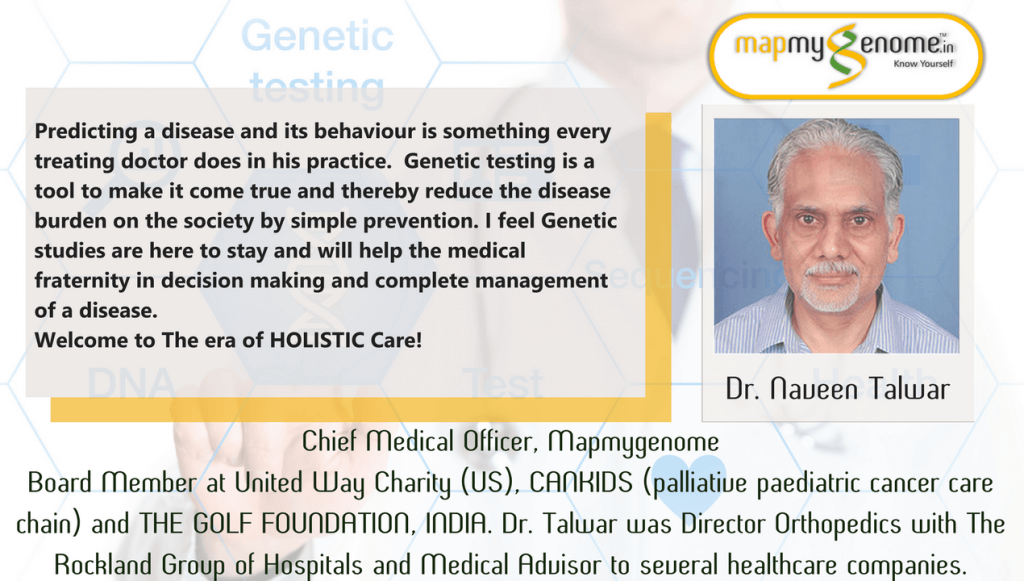
Dr. Talwar is the Chief Medical Officer, Mapmygenome, Board Member at United Way Charity (US), CANKIDS (palliative paediatric cancer care chain) and THE GOLF FOUNDATION, INDIA. Dr. Talwar was Director Orthopedics with The Rockland Group of Hospitals and Medical Advisor to several healthcare companies.
Predicting a disease and its behaviour is something every treating doctor does in his practice. Genetic testing is a tool to make it come true and thereby reduce the disease burden on the society by simple prevention. I feel Genetic studies are here to stay and will help the medical fraternity in decision making and complete management of a disease.
Welcome to The era of HOLISTIC Care!
Dr. Radha Rama Devi
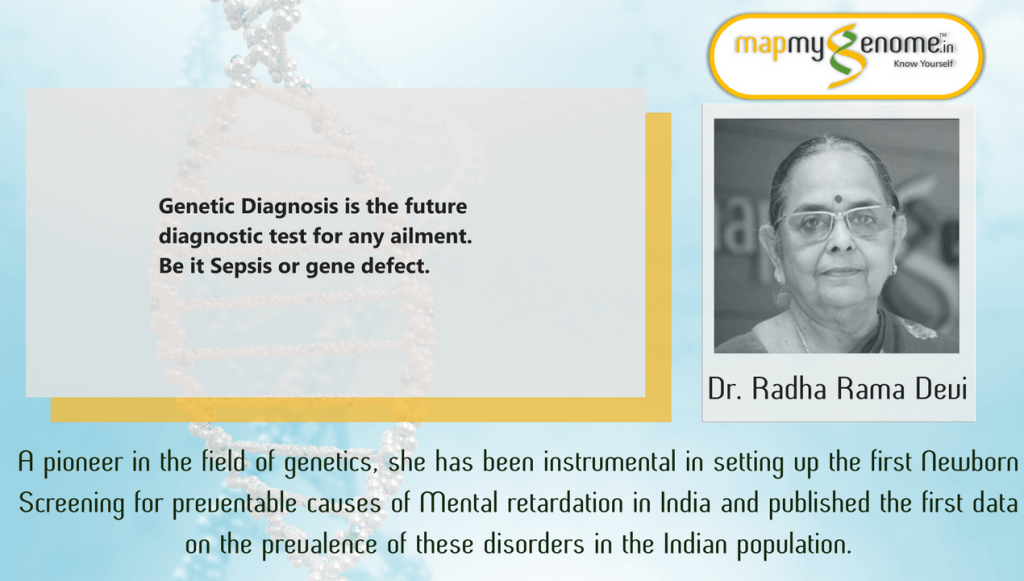
A pioneer in the field of genetics, she has been instrumental in setting up the first Newborn Screening for preventable causes of Mental retardation in India and published the first data on the prevalence of these disorders in the Indian population.
Genetic Diagnosis is the future diagnostic test for any ailment. Be it Sepsis or gene defect.
Dr. Swapna Yendru
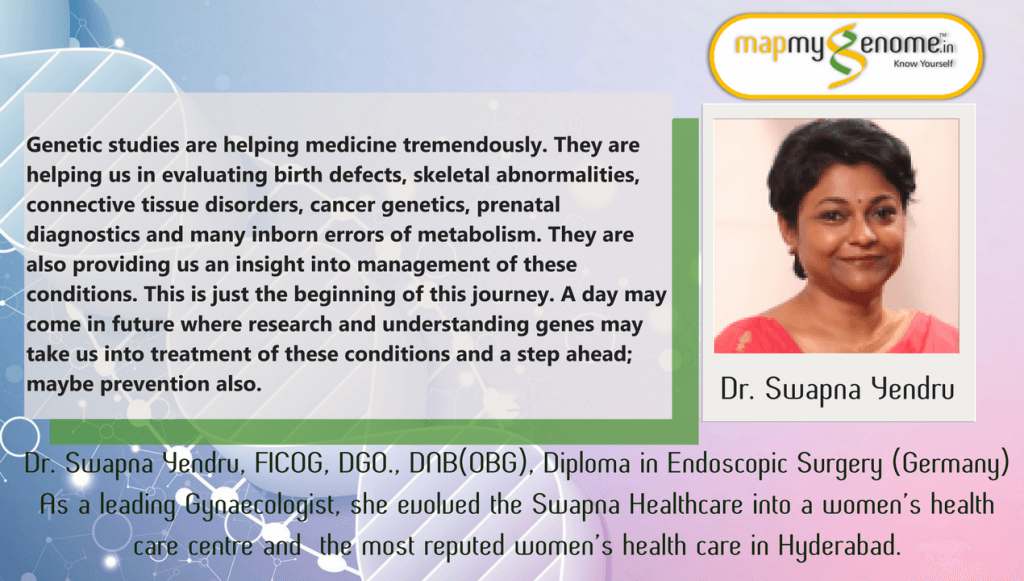
Dr. Swapna Yendru, FICOG, DGO., DNB(OBG), Diploma in Endoscopic Surgery (Germany)
As a leading Gynaecologist, she evolved the Swapna Healthcare into a women’s health care centre and the most reputed women’s health care in Hyderabad.
Genetic studies are helping medicine tremendously. They are helping us in evaluating birth defects, skeletal abnormalities, connective tissue disorders, cancer genetics, prenatal diagnostics and many inborn errors of metabolism. They are also providing us an insight into management of these conditions. This is just the beginning of this journey. A day may come in future where research and understanding genes may take us into treatment of these conditions and a step ahead; maybe prevention also.
Dr. Ravi N Bathina
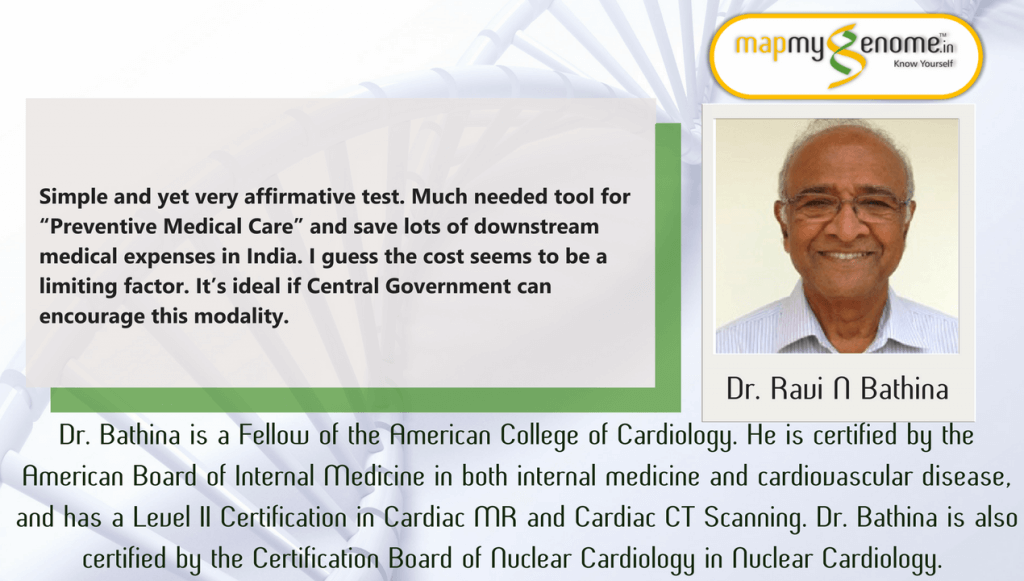
Dr. Bathina is a Fellow of the American College of Cardiology. He is certified by the American Board of Internal Medicine in both internal medicine and cardiovascular disease, and has a Level II Certification in Cardiac MR and Cardiac CT Scanning. Dr. Bathina is also certified by the Certification Board of Nuclear Cardiology in Nuclear Cardiology.
Simple and yet very affirmative test. Much needed tool for “Preventive Medical Care” and save lots of downstream medical expenses in India. I guess the cost seems to be a limiting factor. It’s ideal if Central Government can encourage this modality.
Dr. Krishnam Raju
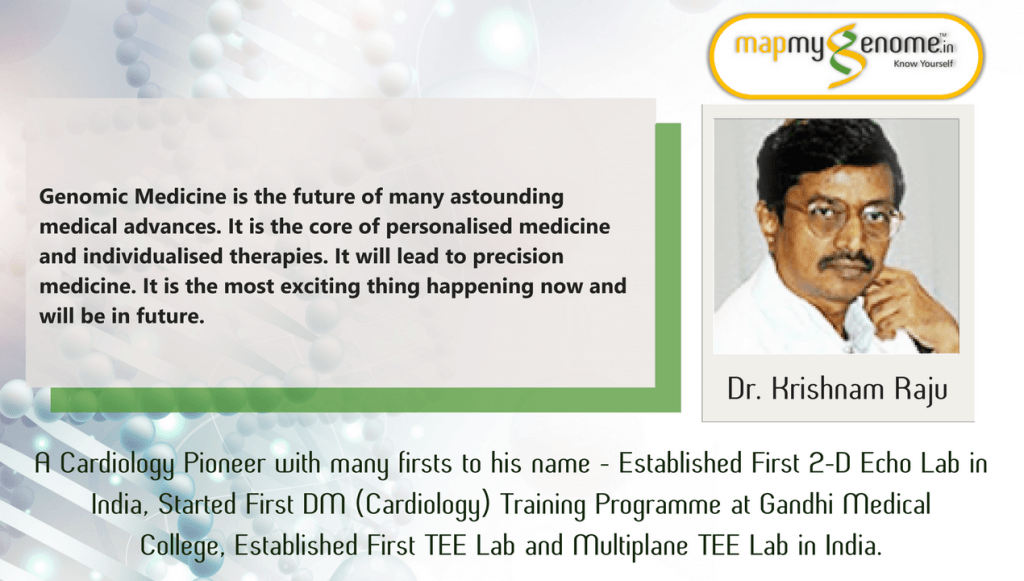
A Cardiology Pioneer with many firsts to his name – Established First 2-D Echo Lab in India, Started First DM (Cardiology) Training Programme at Gandhi Medical College, Established First TEE Lab and Multiplane TEE Lab in India.
Genomic Medicine is the future of many astounding medical advances. It is the core of personalised medicine and individualised therapies. It will lead to precision medicine. It is the most exciting thing happening now and will be in future.
Dr. P. Raghu Ram
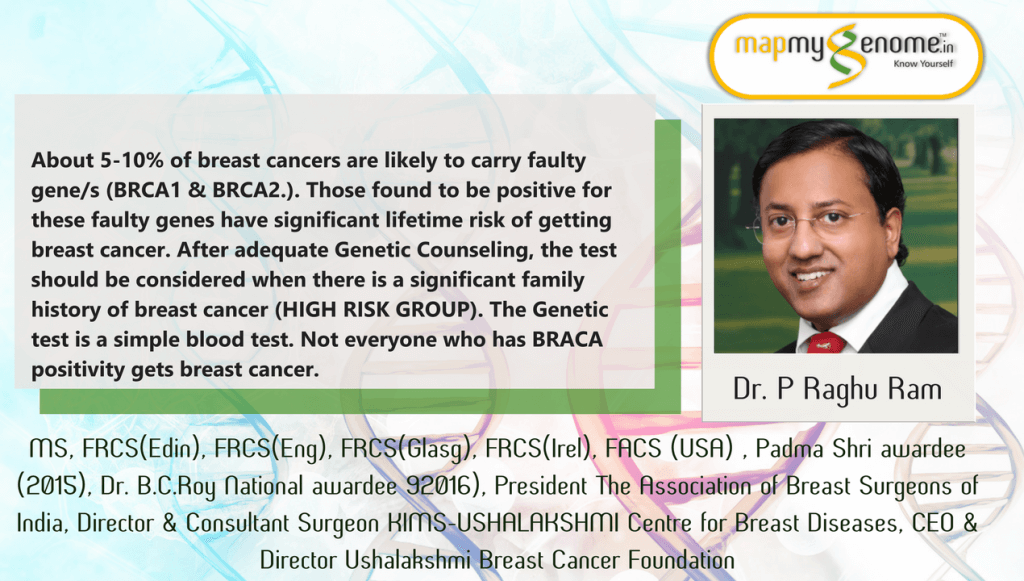
MS, FRCS(Edin), FRCS(Eng), FRCS(Glasg), FRCS(Irel), FACS (USA) , Padma Shri awardee (2015), Dr. B.C.Roy National awardee 92016), President The Association of Breast Surgeons of India, Director & Consultant Surgeon KIMS-USHALAKSHMI Centre for Breast Diseases, CEO & Director Ushalakshmi Breast Cancer Foundation
On Doctors day, I would like to remind myself of an important component of Hippocratic Oath, which is to ‘keep the good of the patient’ as my highest priority.
‘About 5-10% of breast cancers are likely to carry faulty gene/s (BRCA1 & BRCA2.). Those found to be positive for these faulty genes have significant lifetime risk of getting breast cancer. After adequate Genetic Counseling, the test should considered when there is a significant family history of breast cancer (HIGH RISK GROUP). The Genetic test is a simple blood test. Not everyone who has BRACA positivity gets breast cancer. If the blood test is positive, the lifetime risk of developing breast cancer and ovarian cancer is very high (50 – 85% for breast cancer and 15 -45% for Ovarian cancer). Although risk reducing surgery ensures substantial risk reduction, there are other well established non surgical options.’
Dr. Bishnu Panigrahi
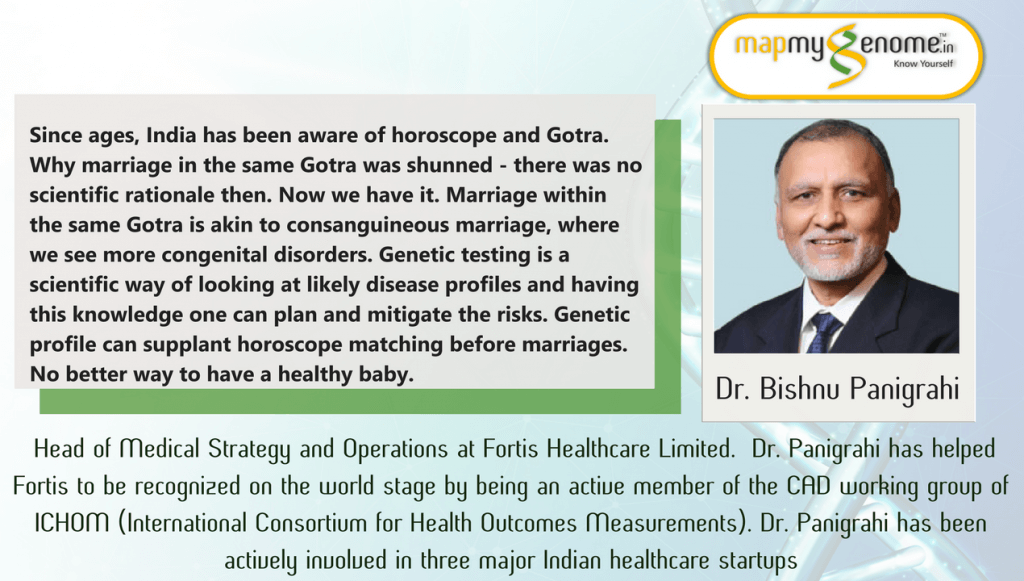
Head of Medical Strategy and Operations at Fortis Healthcare Limited. Dr. Panigrahi has helped Fortis to be recognized on the world stage by being an active member of the CAD working group of ICHOM (International Consortium for Health Outcomes Measurements). Dr. Panigrahi has been actively involved in three major Indian healthcare startups
Since ages, India has been aware of horoscope and Gotra. Why marriage in the same Gotra was shunned – there was no scientific rationale then. Now we have it. Marriage within the same Gotra is akin to consanguineous marriage, where we see more congenital disorders. Genetic testing is a scientific way of looking at likely disease profiles and having this knowledge one can plan and mitigate the risks. Genetic profile can supplant horoscope matching before marriages. No better way to have a healthy baby.
Dr. Pramati Reddy
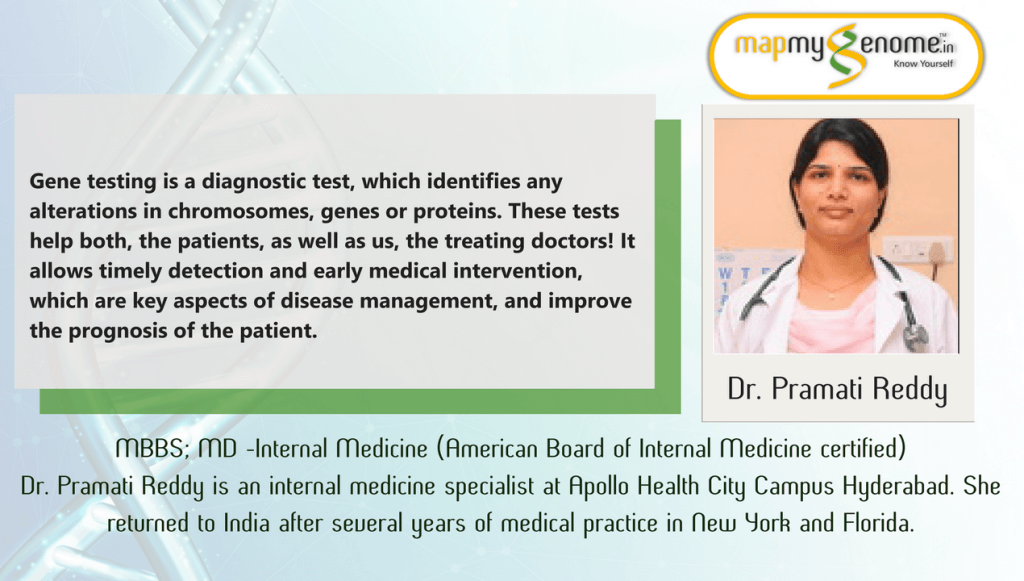
MBBS; MD -Internal Medicine (American Board of Internal Medicine certified)
Dr. Pramati Reddy is an internal medicine specialist at Apollo Health City Campus Hyderabad. She returned to India after several years of medical practice in New York and Florida.
Gene testing is a diagnostic test, which identifies any alterations in chromosomes, genes or proteins. These tests help both, the patients, as well as us, the treating doctors! It allows timely detection and early medical intervention, which are key aspects of disease management, and improve the prognosis of the patient.
Dr. Manjula Anagani
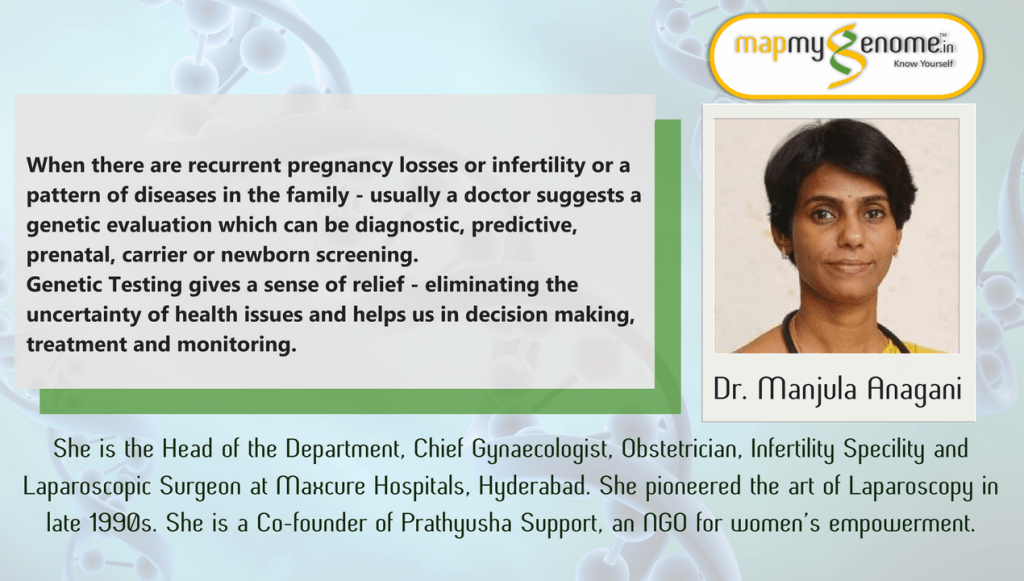
She is the Head of the Department, Chief Gynaecologist, Obstetrician, Infertility Specility and Laparoscopic Surgeon at Maxcure Hospitals, Hyderabad. She pioneered the art of Laparoscopy in late 1990s. She is a Co-founder of Prathyusha Support, an NGO for women’s empowerment.
When there are recurrent pregnancy losses or infertility or a pattern of diseases in the family – usually a doctor suggests a genetic evaluation which can be diagnostic, predictive, prenatal, carrier or newborn screening.
Genetic Testing gives a sense of relief – eliminating the uncertainty of health issues and helps us in decision making, treatment and monitoring.
Dr. Mohan Krishna Dega
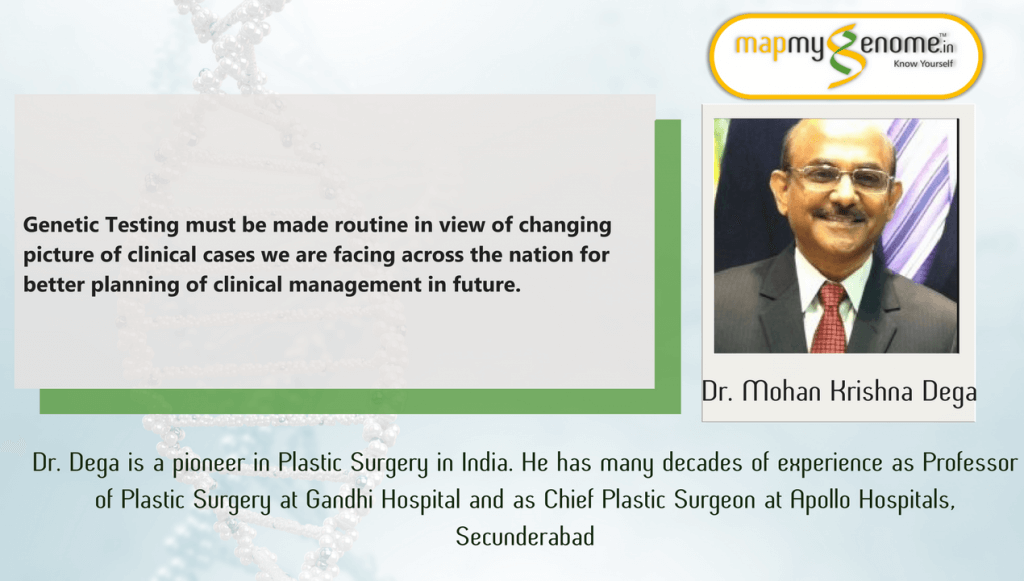
Dr. Dega is a pioneer in Plastic Surgery in India. He has many decades of experience as Professor of Plastic Surgery at Gandhi Hospital and as Chief Plastic Surgeon at Apollo Hospitals, Secunderabad
Genetic Testing must be made routine in view of changing picture of clinical cases we are facing across the nation for better planning of clinical management in future.
Dr. GS Kochar
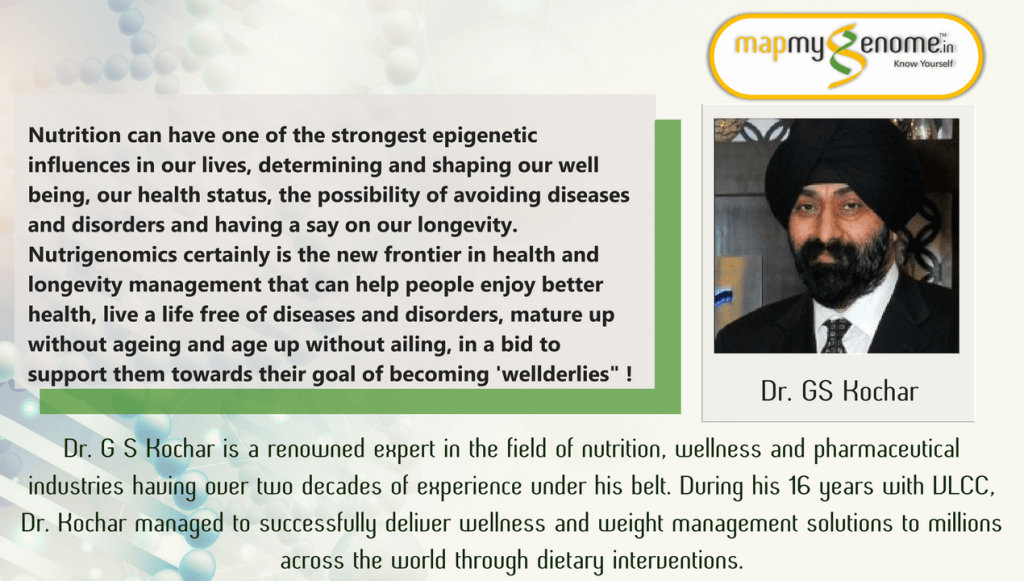
Dr. G S Kochar is a renowned expert in the field of nutrition, wellness and pharmaceutical industries having over two decades of experience under his belt. During his 16 years with VLCC, Dr. Kochar managed to successfully deliver wellness and weight management solutions to millions across the world through dietary interventions.
Nutrition can have one of the strongest epigenetic influences in our lives, determining and shaping our well being, our health status, the possibility of avoiding diseases and disorders and having a say on our longevity.
Nutrigenomics certainly is the new frontier in health and longevity management that can help people enjoy better health, live a life free of diseases and disorders, mature up without ageing and age up without ailing, in a bid to support them towards their goal of becoming ‘wellderlies”!
At Nutribiome we are excited with the prospect of helping our clients with highly customised nutritional guidance aided and guided by their genetic profiling, in general and in specific looking for risk predisposition through genetic marker testing.
And we are happy to collaborate with Mapmygenome in this effort.
Dr. B. S. Ajai Kumar
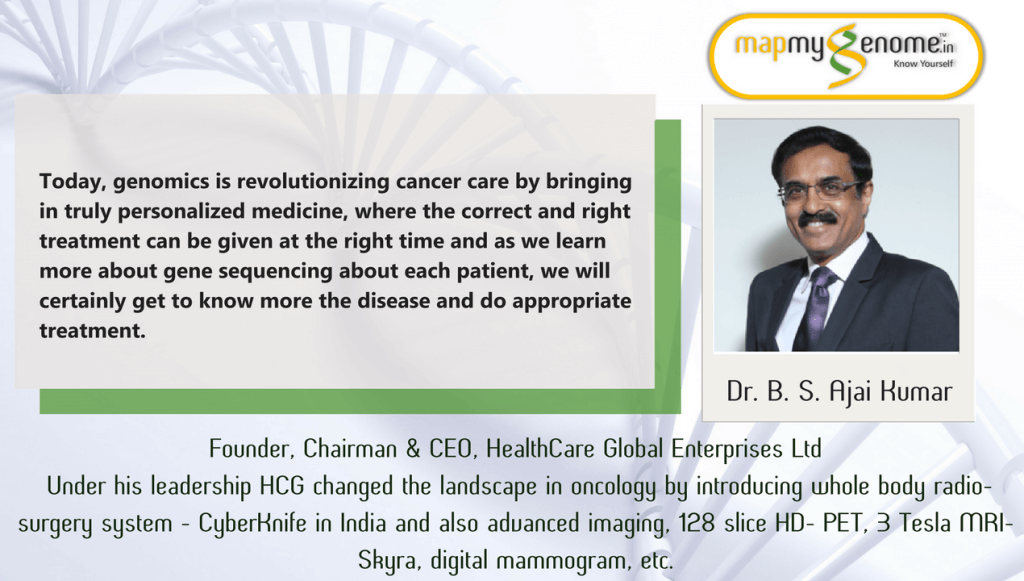
Founder, Chairman & CEO, HealthCare Global Enterprises Ltd.
Under his leadership HCG changed the landscape in oncology by introducing whole body radio-surgery system – CyberKnife in India and also advanced imaging, 128 slice HD- PET, 3 Tesla MRI- Skyra, digital mammogram, etc.
Today, genomics is revolutionizing cancer care by bringing in truly personalized medicine, where the correct and right treatment can be given at the right time and as we learn more about gene sequencing about each patient, we will certainly get to know more the disease and do appropriate treatment.
Dr. Chetan Jayade
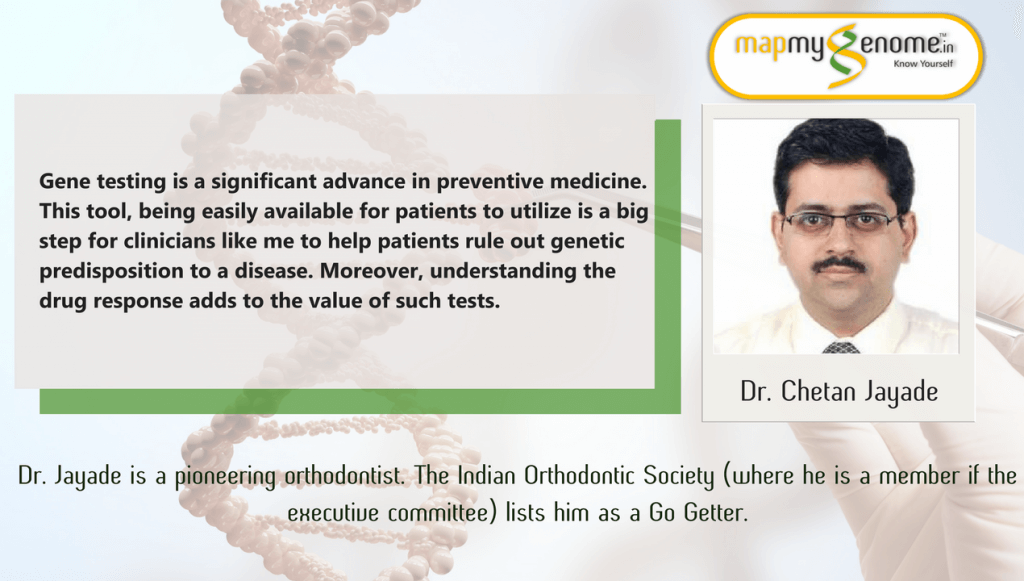
Dr. Jayade is a pioneering orthodontist. The Indian Orthodontic Society (where he is a member if the executive committee) lists him as a Go Getter.
Gene testing is a significant advance in preventive medicine. This tool, being easily available for patients to utilize is a big step for clinicians like me to help patients rule out genetic predisposition to a disease. Moreover, understanding the drug response adds to the value of such tests.
Dr Chaitanya Buch
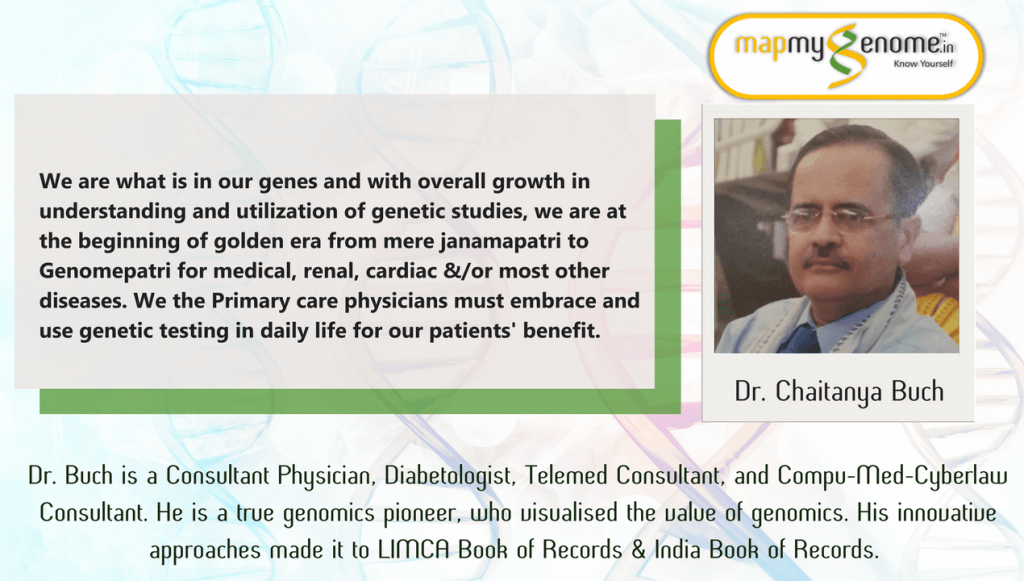
Dr. Buch is a Consultant Physician, Diabetologist, Telemed Consultant, and Compu-Med-Cyberlaw Consultant. He is a true genomics pioneer, who visualised the value of genomics. His innovative approaches made it to LIMCA Book of Records & India Book of Records.
We are what is in our genes and with overall growth in understanding and utilization of genetic studies, we are at the beginning of golden era from mere janamapatri to Genomepatri for medical, renal, cardiac &/or most other diseases. We the Primary care physicians must embrace and use genetic testing in daily life for our patients’ benefit.
Dr. Mala Arora
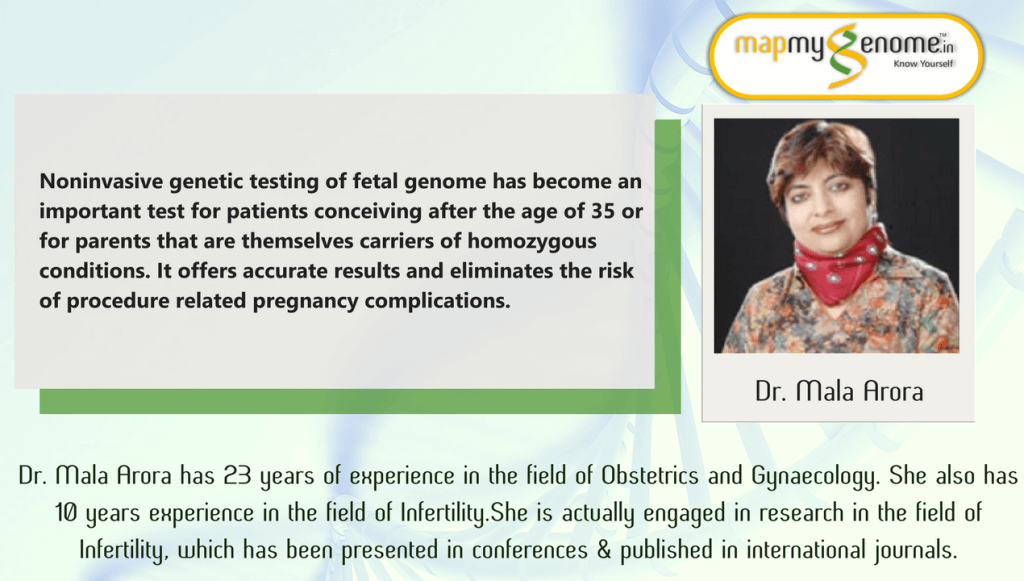
Dr. Mala Arora has 23 years of experience in the field of Obstetrics and Gynaecology. She also has 10 years experience in the field of Infertility.She is actually engaged in research in the field of Infertility, which has been presented in conferences & published in international journals.
Noninvasive genetic testing of fetal genome has become an important test for patients conceiving after the age of 35 or for parents that are themselves carriers of homozygous conditions. It offers accurate results and eliminates the risk of procedure related pregnancy complications.
Dr. Rakesh Jain
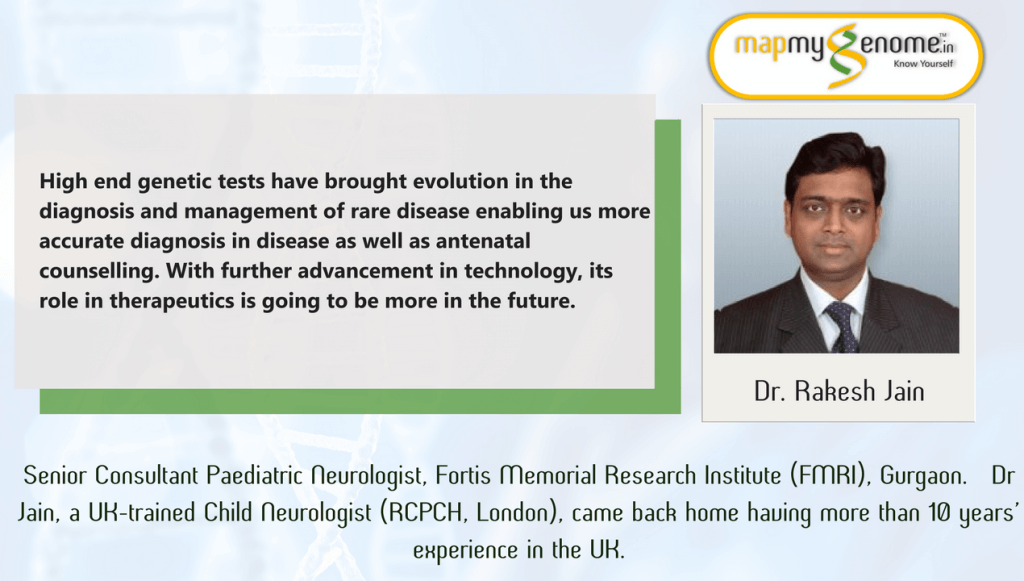
Senior Consultant Paediatric Neurologist, Fortis Memorial Research Institute (FMRI), Gurgaon. Dr Jain, a UK-trained Child Neurologist (RCPCH, London), came back home having more than 10 years’ experience in the UK.
High end genetic tests have brought evolution in the diagnosis and management of rare disease enabling us more accurate diagnosis in disease as well as antenatal counselling. With further advancement in technology, its role in therapeutics is going to be more in the future.
Dr. Rajiv Chhabra
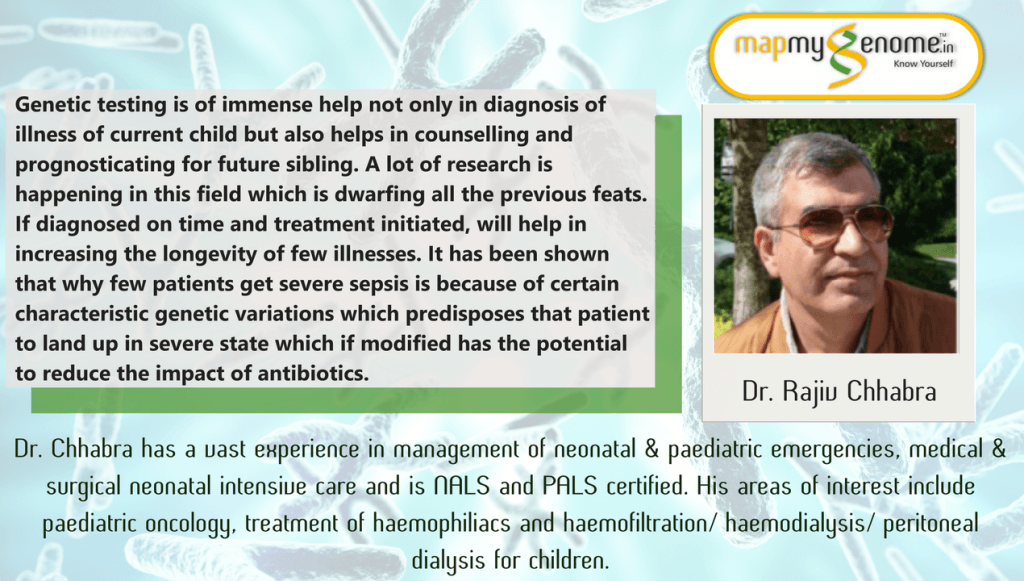
Dr. Chhabra has a vast experience in management of neonatal & paediatric emergencies, medical & surgical neonatal intensive care and is NALS and PALS certified. His areas of interest include paediatric oncology, treatment of haemophiliacs and haemofiltration/ haemodialysis/ peritoneal dialysis for children.
Genetic testing is of immense help not only in diagnosis of illness of current child but also helps in counselling and prognosticating for future sibling. A lot of research is happening in this field which is dwarfing all the previous feats. If diagnosed on time and treatment initiated, will help in increasing the longevity of few illnesses. It has been shown that why few patients get severe sepsis is because of certain characteristic genetic variations which predisposes that patient to land up in severe state which if modified has the potential to reduce the impact of antibiotics.
Dr. K. Gayatri
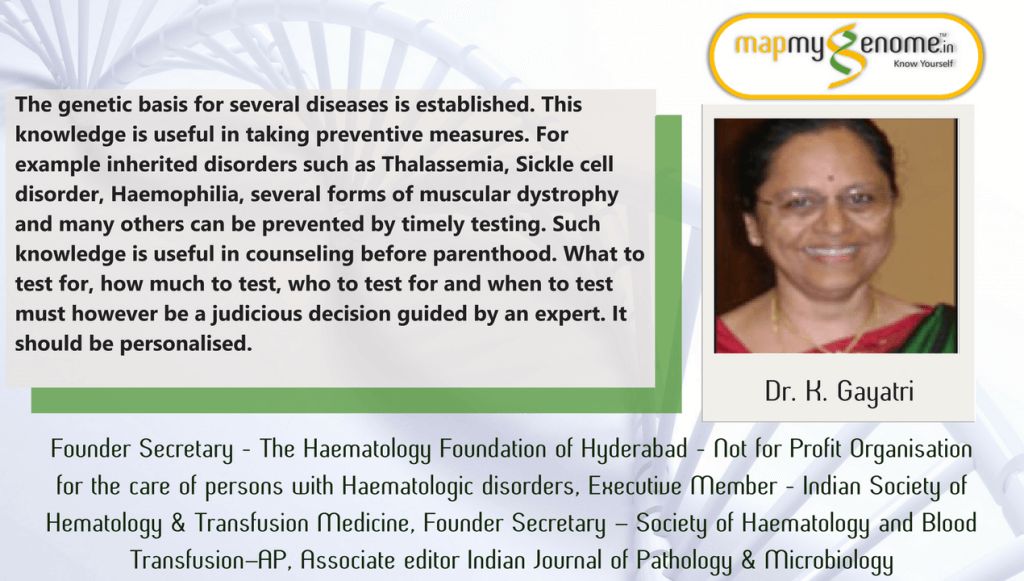
Some of her achievements: Founder Secretary – The Haematology Foundation of Hyderabad – Not for Profit Organisation for the care of persons with Haematologic disorders, Executive Member – Indian Society of Hematology & Transfusion Medicine, Founder Secretary – Society of Haematology and Blood Transfusion–AP, Associate editor Indian Journal of Pathology & Microbiology
The genetic basis for several diseases is established. This knowledge is useful in taking preventive measures. For example inherited disorders such as Thalassemia, Sickle cell disorder, Haemophilia, several forms of muscular dystrophy and many others can be prevented by timely testing. Such knowledge is useful in counseling before parenthood. What to test for, how much to test, who to test for and when to test must however be a judicious decision guided by an expert. It should be personalised.
Dr. Gagan Saini
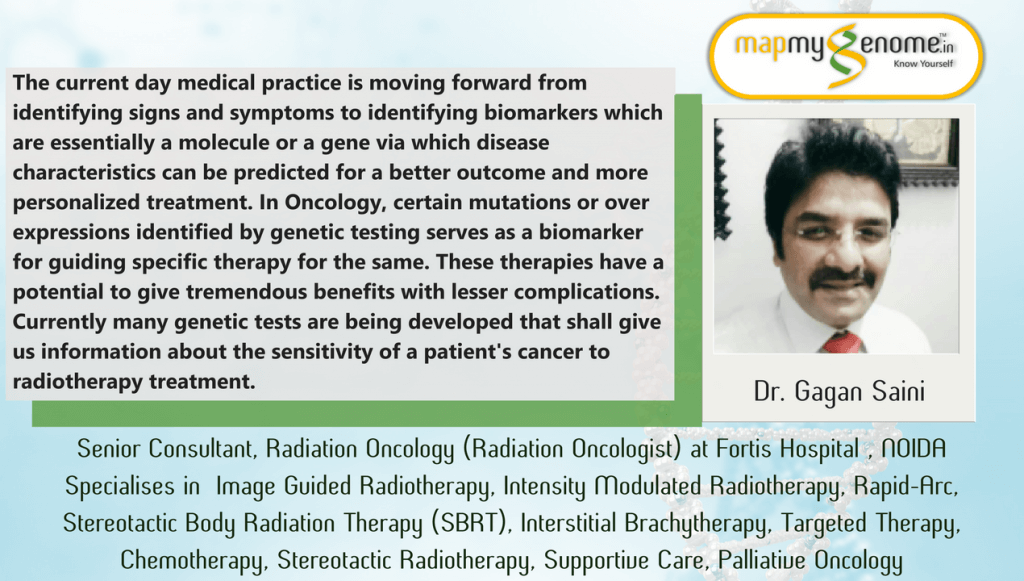
Senior Consultant, Radiation Oncology (Radiation Oncologist) at Fortis Hospital, NOIDA
Specialises in Image Guided Radiotherapy, Intensity Modulated Radiotherapy, Rapid-Arc, Stereotactic Body Radiation Therapy (SBRT), Interstitial Brachytherapy, Targeted Therapy, Chemotherapy, Stereotactic Radiotherapy, Supportive Care, Palliative Oncology
The current day medical practice is moving forward from identifying signs and symptoms to identifying biomarkers which are essentially a molecule or a gene via which disease characteristics can be predicted for a better outcome and more personalized treatment. In Oncology, certain mutations or over expressions identified by genetic testing serves as a biomarker for guiding specific therapy for the same. These therapies have a potential to give tremendous benefits with lesser complications. Currently many genetic tests are being developed that shall give us information about the sensitivity of a patient’s cancer to radiotherapy treatment.
Dr. Sudha Garg
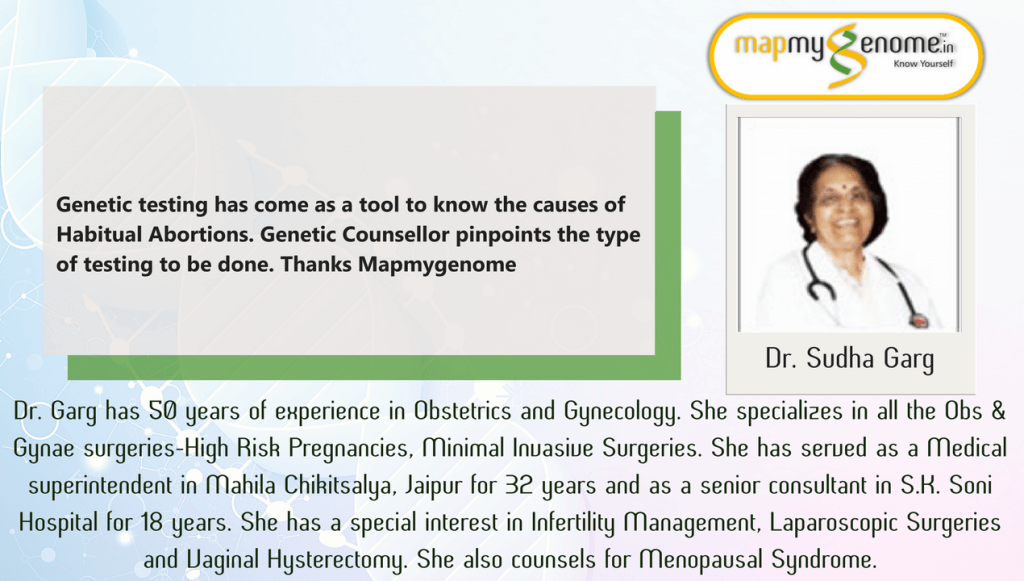
Dr. Garg has 50 years of experience in Obstetrics and Gynecology. She specializes in all the Obs & Gynae surgeries-High Risk Pregnancies, Minimal Invasive Surgeries. She has served as a Medical superintendent in Mahila Chikitsalya, Jaipur for 32 years and as a senior consultant in S.K. Soni Hospital for 18 years. She has a special interest in Infertility Management, Laparoscopic Surgeries and Vaginal Hysterectomy. She also counsels for Menopausal Syndrome.
Genetic testing has come as a tool to know the causes of Habitual Abortions. Genetic Counsellor pinpoints the type of testing to be done. Thanks Mapmygenome!
Dr. Ann Agnes Mathew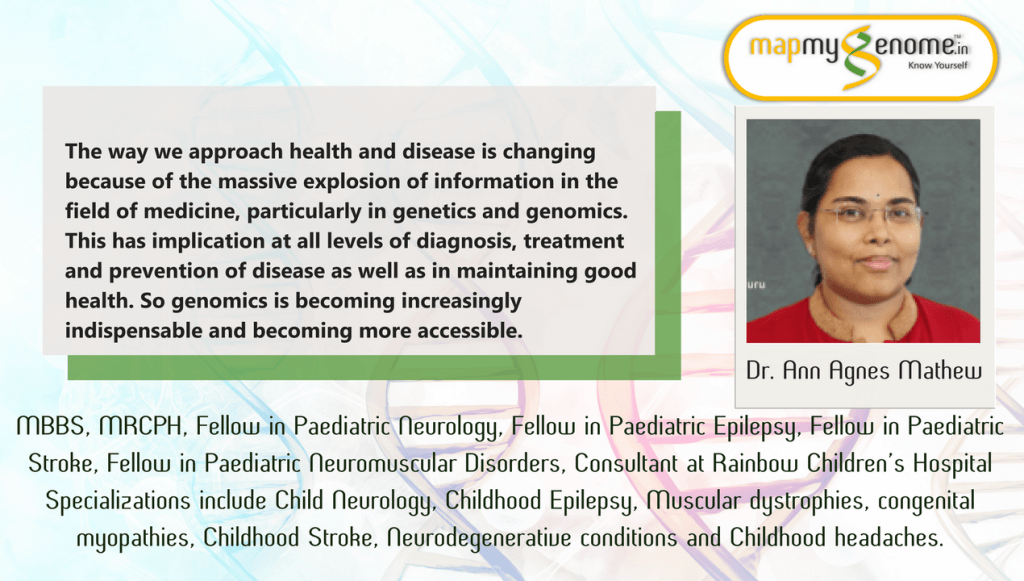
MBBS, MRCPH, Fellow in Paediatric Neurology, Fellow in Paediatric Epilepsy, Fellow in Paediatric Stroke, Fellow in Paediatric Neuromuscular Disorders, Consultant at Rainbow Children’s Hospital
Specializations include Child Neurology, Childhood Epilepsy, Muscular dystrophies, congenital myopathies, Childhood Stroke, Neurodegenerative conditions and Childhood headaches.
The way we approach health and disease is changing because of the massive explosion of information in the field of medicine, particularly in genetics and genomics. This has implication at all levels of diagnosis, treatment and prevention of disease as well as in maintaining good health. So genomics is becoming increasingly indispensable and becoming more accessible.
Dr. Satyen K Hemrajani
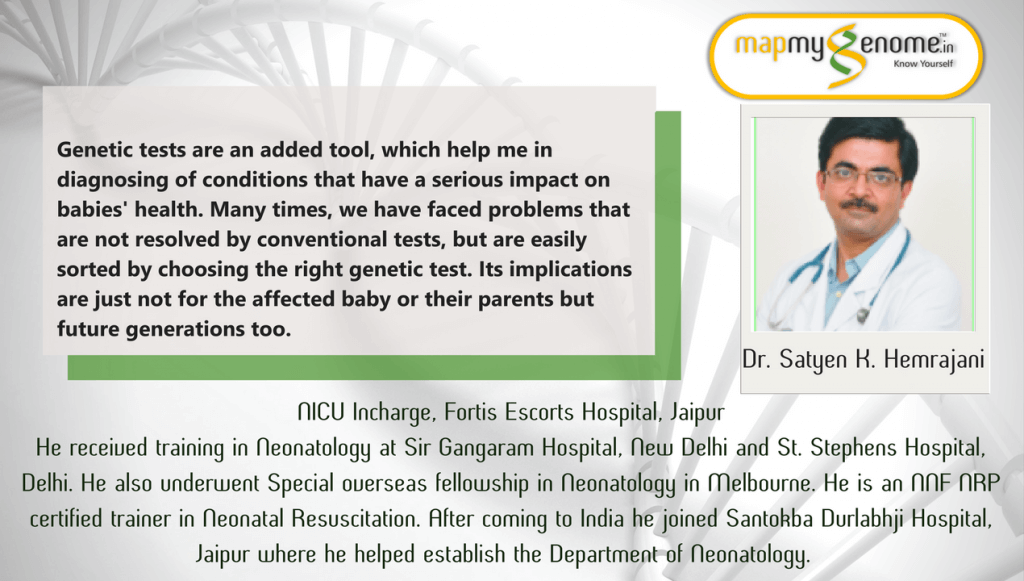
NICU Incharge, Fortis Escorts Hospital, Jaipur
He received training in Neonatology at Sir Gangaram Hospital, New Delhi and St. Stephens Hospital, Delhi. He also underwent Special overseas fellowship in Neonatology in Melbourne. He is an NNF NRP certified trainer in Neonatal Resuscitation. After coming to India he joined Santokba Durlabhji Hospital, Jaipur where he helped establish the Department of Neonatology.
Genetic tests are an added tool, which help me in diagnosing of conditions that have a serious impact on babies’ health. Many times, we have faced problems that are not resolved by conventional tests, but are easily sorted by choosing the right genetic test. Its implications are just not for the affected baby or their parents but future generations too.
Dr. BR Das
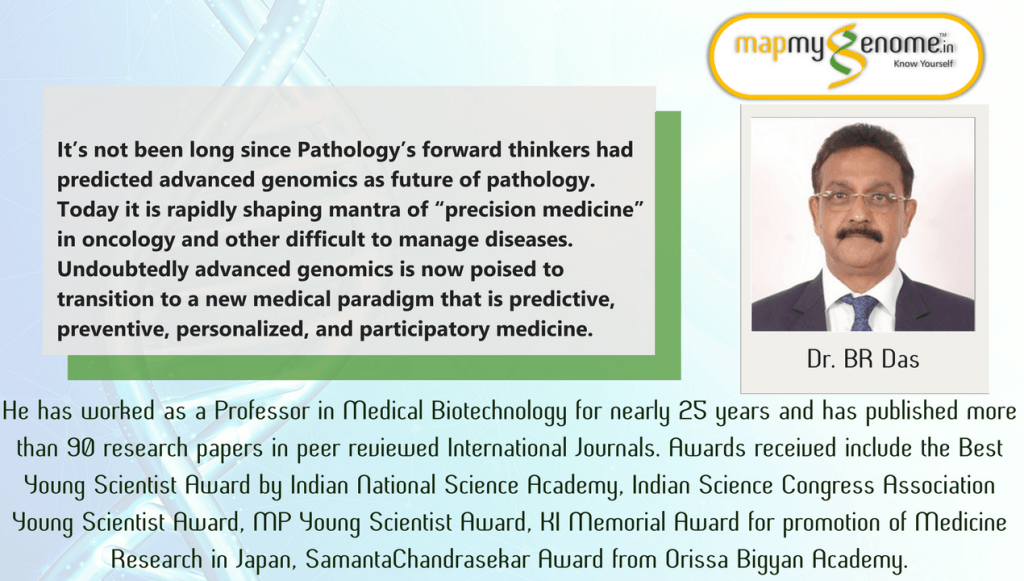
He has worked as a Professor in Medical Biotechnology for nearly 25 years and has published more than 90 research papers in peer reviewed International Journals. Awards received include the Best Young Scientist Award by Indian National Science Academy, Indian Science Congress Association Young Scientist Award, MP Young Scientist Award, KI Memorial Award for promotion of Medicine Research in Japan, SamantaChandrasekar Award from Orissa Bigyan Academy.
It’s not been long since Pathology’s forward thinkers had predicted advanced genomics as future of pathology. Today it is rapidly shaping mantra of “precision medicine” in oncology and other difficult to manage diseases. Undoubtedly advanced genomics is now poised to transition to a new medical paradigm that is predictive, preventive, personalized, and participatory medicine.
Dr. Vikrant Sigh Bhar
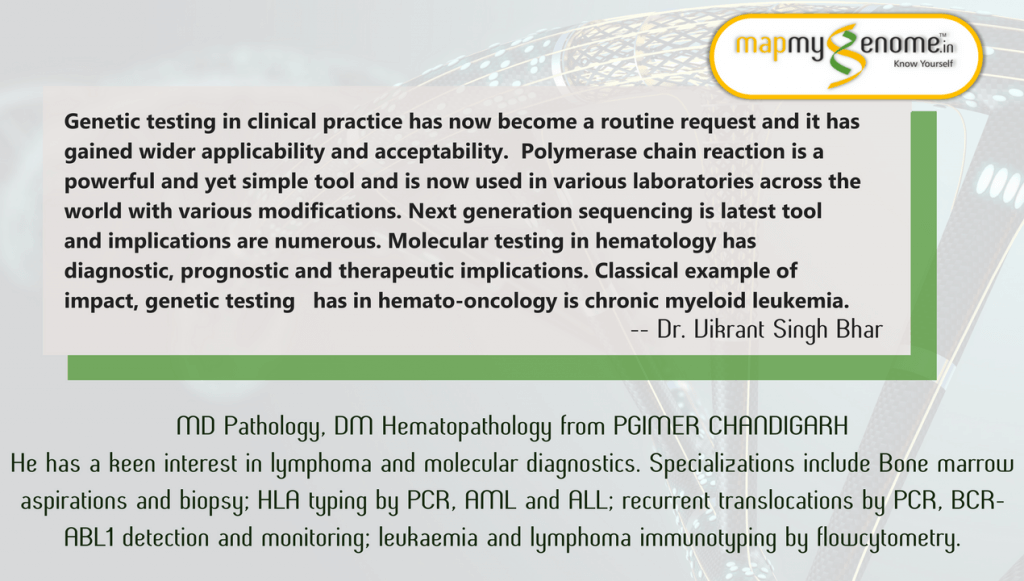
MD Pathology, DM Hematopathology from PGIMER CHANDIGARH
He has a keen interest in lymphoma and molecular diagnostics. Specializations include Bone marrow aspirations and biopsy; HLA typing by PCR, AML and ALL; recurrent translocations by PCR, BCR-ABL1 detection and monitoring; leukaemia and lymphoma immunotyping by flowcytometry.
Genetic testing in clinical practice has now become a routine request and it has gained wider applicability and acceptability. Polymerase chain reaction is a powerful and yet simple tool and is now used in various laboratories across the world with various modifications. Next generation sequencing is latest tool and implications are numerous. Molecular testing in hematology has diagnostic, prognostic and therapeutic implications. Classical example of impact, genetic testing has in hemato-oncology is chronic myeloid leukemia. Philadelphia chromosome was discovered on conventional metaphase preparation and it was consistent finding in all cases of CML. Soon enough it was found that CML involve reciprocal translocation of BCR and ABL1 genes leading to chimeric protein with enhanced kinase properties leading to proliferation of malignant clone. Molecular testing using PCR for BCR-ABL1 translocation was soon introduced in the laboratories. Later Imatinib was discovered as a wonder molecule targeting chimeric protein, which changed the course of CML disease, markedly improving the prognosis. Currently Real time PCR is used routinely to monitor response to tyrosine kinase inhibitor therapy. Patients not responding to therapy well are tested for tyrosine kinase domain mutations using PCR or gene sequencing which help in deciding further therapy. New WHO update on myeloid and lymphoid neoplasms has introduced more entities specified by genetic abnormalities. Newer molecules targeting specific abnormalities have been introduced in the clinical practice and more are to come in near future. Road ahead is bright and green. Pathologists have bigger role to play in future as they are bridge between research and physicians directly dealing with the patients. We need to understand our responsibilities while using genetic testing for patient care. A rational use of genetic testing can only be done by deeper understanding of genetic abnormalities and their implications in clinical practice. Also we need continued research for more molecular genetic abnormalities and newer molecular targets.
I wish all happy doctors day.
